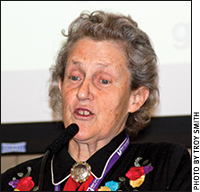ISBCW 2016:
Value of Good Stockmanship
by Troy Smith, field editor
MANHATTAN, Kan. (June 9, 2016) — About 20% of people involved in the care and handling of beef cattle are “naturals.” Stockmanship comes easily for them, compared to the 70% of people who always seem to need supervision. The remaining 10% just should not be handling animals at all. Such was the opinion voiced by animal behavior specialist and Colorado State University Professor Temple Grandin during the fifth International Symposium on Beef Cattle Welfare June 8-10, 2016, in Manhattan, Kan.
“Actually, cattle handling has improved immensely since the ‘bad old days,’” allowed Grandin. “That’s good, because stockmanship matters.”

“A good attitude toward animals improves both productivity and handling practices,” said Temple Grandin, noting that stockmanship training can improve handler attitude.
Grandin said people want to know the magic thing that makes handling cattle easy, whether it’s state-of-the-art facilities or something else. She tells them there is no “silver bullet” and advises them to “just think” and apply good management. Grandin believes successful stock handling often boils down to attitude. Handlers who approach the job with a bad attitude are likely to have trouble.
“A good attitude toward animals improves both productivity and handling practices,” said Grandin, noting that stockmanship training can improve handler attitude.
Training can affect animal attitudes, too, advising producers to acclimate cattle to their surroundings. Grandin said allowing cattle to become acclimated to people, equipment and working facilities will make cattle easier to handle subsequently. From the standpoint of economics, acclimation helps reduce stress that can hinder weight gain and lower reproductive rates.
“Research — old and new — shows that acclimation enhances cattle performance,” stated Grandin.
According to Grandin, cattle have memories, but can still be surprised by novel experiences.
Exposing animals to a variety of stimuli, including humans on foot, on horseback and in vehicles, putting them through gates, alleys and chutes (without actually performing any processing tasks) can help prevent future surprises and negative responses.
“A first experience needs to be a good first experience,” Grandin emphasized.
Reminding her audience that it’s easier to manage that which can be measured, Grandin recommended audits of the cattle-handling practices of feedlot and ranch personnel — not a big, burdensome paperwork audit, but an evaluation using an objective numerical scoring system. Scoring on the basis of observable things such as the percentage of animals that, because of handling practices, bump into fences and other cattle, slip and fall, or run when exiting a squeeze chute can show if handling practices are problematic.
“Attention to directly observable things that are outcomes of bad practices or bad facilities can prevent bad from becoming normal,” stated Grandin.
Grandin said genetics has played a role in improving cattle handling, to the extent that selection for calm temperament has resulted in increased docility across populations.
Grandin expressed concern, however, that it has coincided with increased cattle conformation problems. She has observed higher incidence of faulty foot and leg conformation, in particular, which portends problems from the standpoint of production and animal welfare.
“We need to head this off at the pass, before it becomes a real problem,” Grandin warned. “Be careful of the new ‘power tools’ for genetic selection, so that you don’t inadvertently select for structural problems. We still need to use visual appraisal.”
Watch for additional coverage of the 2016 ISBCW on www.angus.media and in theAngus JournalandAngus Beef Bulletin.Comprehensive meeting coverage will be archived at www.api-virtuallibrary.com/meetings_other_news.html.
Editor’s Note: The articles used within this site represent a mixture of copyrights. If you would like to reprint or repost an article, you must first request permission of Angus Productions Inc. (API) by contacting the editor at 816-383-5200; 3201 Frederick Ave., Saint Joseph, MO 64506. API claims copyright to this web site as presented. We welcome educational venues and cattlemen to link to this site as a service to their audience.
